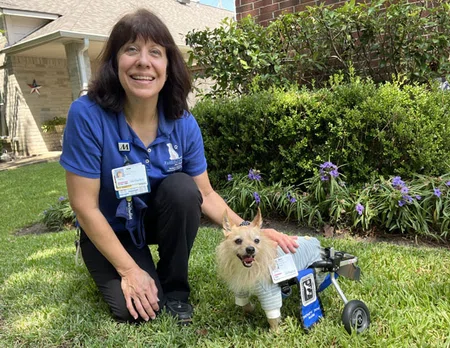© 2025. Houston Methodist, Houston, TX. All rights reserved.


In this
issue

WELCOME
NURSING SCIENCE

Holistic Care and the Use of Aromatherapy in Clinical Practice

Utilizing Music Therapy in Nursing Research
EDUCATION

Spiritual Care and Nursing Across the Houston Methodist System

Beyond Medicine: The Impact of Pet Therapy in Healthcare
PRACTICE

Narration of Care: A Bridge to Whole-Person Healing

Sweet Dreams, Sharp Minds: How Holistic Nursing and Sleep Hygiene Are Teaming Up to Tackle Delirium
PROFESSIONAL DEVELOPMENT
MAGNET
FROM OUR TEAMS

ABOUT DISCOVERN
EDUCATION
Spiritual Care and Nursing Across the Houston Methodist System

This article sheds light on the sacred work of spiritual care and the transformative power of holistic healing. From the compassionate presence of chaplains walking alongside patients and nurses, to the emotional resilience required on the long road of organ transplant, these stories reflect Houston Methodist’s unwavering commitment to nurturing body, mind, and spirit. Through collaboration, empathy, and intentional care, our teams create spaces of trust, hope, and renewal—for patients, families, and one another. Read about some of the work our amazing chaplains are doing throughout the Houston Methodist system.
Houston Methodist Clear Lake


Supporting Body, Mind, and Spirit: The Chaplain's Role in Healthcare
By Tracy Lee, Director, Spiritual Care & Values Integration, Houston Methodist Clear Lake
By Tracy Lee, Director, Spiritual Care & Values Integration, Houston Methodist Clear Lake
At Houston Methodist, we understand that every patient is a whole person—body, mind and spirit. Our mission reflects this belief, stating our commitment to "create a spiritual environment of care." While chaplains play a central role in this mission, every staff member contributes to nurturing this environment. Chaplains often hear heartfelt praise from patients about the compassion and dedication of their nurses, therapists and other caregivers.
As integral interdisciplinary care team members, chaplains work closely with other staff members. They visit patients and families to assess their emotional and spiritual well-being, inner strengths and support systems. Personalized interventions may include prayer, gratitude practices, active listening and meditation. Houston Methodist Clear Lake strives to connect with every patient at least once before discharge. However, this can be a significant challenge with the fast-paced nature of care. That's why collaboration with bedside nurses is essential—especially for patients experiencing emotional distress, receiving new diagnoses or feeling anxiety before procedures. Nurse-initiated consults help chaplains prioritize where they are most needed. We've seen firsthand how a patient’s recovery can improve when they feel heard and supported, often becoming more receptive to their care team.
Spiritual Care from Day One
To ensure that all staff understand the importance of holistic care, chaplains at Houston Methodist Clear Lake provide training during new employee onboarding. This session introduces the role of spiritual care in the hospital setting and equips staff with tools to recognize and respond to patients' emotional and spiritual needs. The training also emphasizes the importance of self-care and encourages staff to seek support when needed. By embedding these values from the outset, we cultivate a culture where compassion, presence and whole-person care are integral to everyday practice.
Chaplains also provide vital support to staff. In the demanding world of healthcare, professionals often focus so intently on others that they overlook their needs. Chaplains build meaningful relationships with staff and offer emotional and spiritual care through heartfelt conversations, self-care discussions, prayer (individual or group) and reflective moments during department huddles. These interactions are designed to uplift and renew, showing our staff that their well-being is prioritized.
Just as airline safety instructions remind passengers to secure their oxygen masks before assisting others, healthcare workers must prioritize their care to effectively care for others. Chaplains help staff overcome the guilt of taking time for personal well-being. By offering encouragement and affirmation, they help prevent burnout and promote resilience. When caregivers are emotionally and mentally well, they experience greater job satisfaction and deliver even better patient care.
Whether supporting patients, families or staff, chaplains provide holistic care to a diverse community. Regardless of their religious background, chaplains meet each person compassionately, seeking ways to support their emotional, mental and spiritual needs. This care beautifully complements the high-quality medical treatment our patients receive, showing that we respect and understand the diverse needs of our community.
Houston Methodist Hospital - Texas Medical Center


The Long, Winding, Remarkable Road of Organ Transplant
By Brian R. Gowan, M.Div., BCC Senior Chaplain, Houston Methodist Hospital - J.C. Walter Jr. Transplant Center
By Brian R. Gowan, M.Div., BCC Senior Chaplain, Houston Methodist Hospital - J.C. Walter Jr. Transplant Center
“Just one more night, and I am off this long, winding road” are the lyrics of a song called Home Sweet Home written and performed by the '80s band Mötley Crüe. Over several weeks, I have been providing spiritual care for a very grateful heart recipient who requested that this song be played during his highly anticipated discharge day celebration, complete with noisemakers, a poem, a prayer of blessing and an enthusiastic confetti fling!
Since 1963, Houston Methodist has been honored to care for more than 11,000 organ recipients, with nearly one-third of our inpatient population as pre- or post-transplant patients. This year, the J.C. Walter Jr. Transplant Center is on pace to perform approximately 800 organ transplants. Every transplant patient, their families and caregivers can identify with the emotional struggles described as “…this long, winding road.” At Houston Methodist, many hospital departments and nursing units that serve our patients—our “guests” on the road to organ transplant—staffed by world-class physicians, transplant coordinators, administrators, case workers, physical therapists and dietitians, to name just a few.
From transplant assessment to waiting, to the transplant itself, to recovery and discharge, highly functioning teams are needed in every department and patient care area to support our patients. Medical team members—and those of us called to assist and support throughout a transplant patient’s rehabilitative process—face the challenge of caring for our own emotional, spiritual, physical, and mental well-being to bring our very best to those we serve. Patients often share these 11 words with us during their transplant journey: “This is the most difficult and scary time of my life.”
A vital key to developing and maintaining highly effective teams is our commitment as care team members to actively and systematically pursue feedback from those we serve—whether during an office visit or for very extended hospitalizations. It is not uncommon for listed transplant patients to be cared for as inpatients for many weeks and sometimes even months. Houston Methodist Hospital’s feedback process provides vital opportunities to learn and grow in our commitment to providing unparalleled care and service.
Over the years, we’ve routinely had grateful and elated organ transplant recipients contact transplant team members to say: “Thank you!”—followed by the question: “Are there any ways I can give back to help others who are seeking a transplant?” At Houston Methodist, we currently have three incredible opportunities for those who have successfully navigated “…this long, winding road” to give back and to support others who are hopeful to receive an organ transplant:
- Digital Storytelling: An opportunity to inspire patients pursuing organ transplants by sharing and recording portions of their transplant stories.
- Peer Mentoring: A chance for organ recipients to apply to become peer mentors to support others on “…the long, winding road” of organ transplant.
- Grateful Hearts Singers: This singing group is composed of organ recipients and living organ donors who perform at hospital events. They also offer “Thank You Singing Rounds” on nursing units and to other “healthcare heroes,” who helped them begin life anew.
Gratitude
- Thanks be to God for all the amazing, selfless organ donors and all the amazing, caring organ donor families.
- Thanks be to God for all the amazing, selfless, generous, and courageous living organ donors.
- Thanks be to God for every member of our amazing, gifted, transplant team, who are given a sacred trust to provide care, healing, and new beginnings for all organ transplant patients.
- Thanks be to God, the Great Physician, who guides and provides grace to all who travel on, and to all who serve those on “…the long, winding road of organ transplant.”
For inquiries, contact: Brian R. Gowan - Sr. Chaplain, Houston Methodist Hospital - J.C.Walter Jr. Transplant Center: brgowan@houstonmethodist.org or 713-394-6737.
Houston Methodist West/Continuing Care


Chaplains And Nurses Partnering to Provide Holistic Care to Our Patients
By Rev. Regina Pair Allen, MDiv, MHSA, BCC, Director, Spiritual Care & Values Integration
Houston Methodist West Hospital, Houston Methodist Continuing Care Hospital
By Rev. Regina Pair Allen, MDiv, MHSA, BCC, Director, Spiritual Care & Values Integration
Houston Methodist West Hospital, Houston Methodist Continuing Care Hospital
For many patients, the hospital can be a lonely and isolating place. It often feels like a desert, filled with overhead code announcements, beeping machines and bustling corridors. While patients might experience the hospital this way, nurses and chaplains see it differently. Together, they provide holistic care that supports patients' physical, emotional and spiritual well-being.
Chaplains journey alongside patients and families throughout their hospital stays. For some, chaplains become what Robert Dykstra calls the “intimate stranger”1. As described in Images of Pastoral Care, chaplains are compassionate presences who walk with patients through their health-care experience. Patients often share their thoughts and fears with chaplains, who relay relevant insights to the nurses to help inform care decisions.
At Houston Methodist West Hospital, the partnership between chaplains and nurses is essential to holistic care. Chaplains create space for patients and families to process emotions and face their realities. They assess spiritual needs and help patients find peace and hope. In doing so, chaplains foster an environment of trust and calm that supports the entire care team.
Meeting patients’ spiritual and emotional needs is our top priority. We offer a listening ear, assistance with advance directives, blessings and anointings, comforting literature, Holy Communion, healing touch, prayer, Scripture reading, singing, spiritual resources relevant to each faith tradition, and a supportive presence. When requested, we also reach out to patients’ spiritual community leaders. Putting patients first means creating a caring environment where both body and soul are nurtured.
We also extend this care to nurses and other team members. When our colleagues feel whole—emotionally and spiritually—they can bring their best selves to patient care.
We are privileged to serve on the interdisciplinary team as agents of hope, reflection, forgiveness and peace.
- As agents of hope, we offer comfort and reassurance.
- As agents of reflection, we encourage introspection and understanding.
- As agents of forgiveness, we help patients and families navigate complex emotions.
- As agents of peace, we strive to create a calm and comforting environment for all.
This care includes all patients—those with specific faith traditions and those with none. We are sojourners for all.
References:
- Robert C. Dykstra, Images of Pastoral Care (St. Louis: Chalice Press, 2005), 123.
- Parker J. Palmer, The Company of Strangers: Christians and the Renewal of America’s Public Life (New York: Crossroad, 1981), 67-68.










